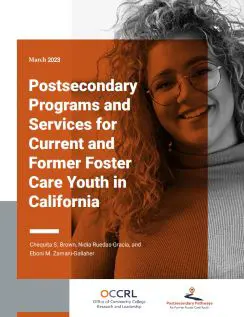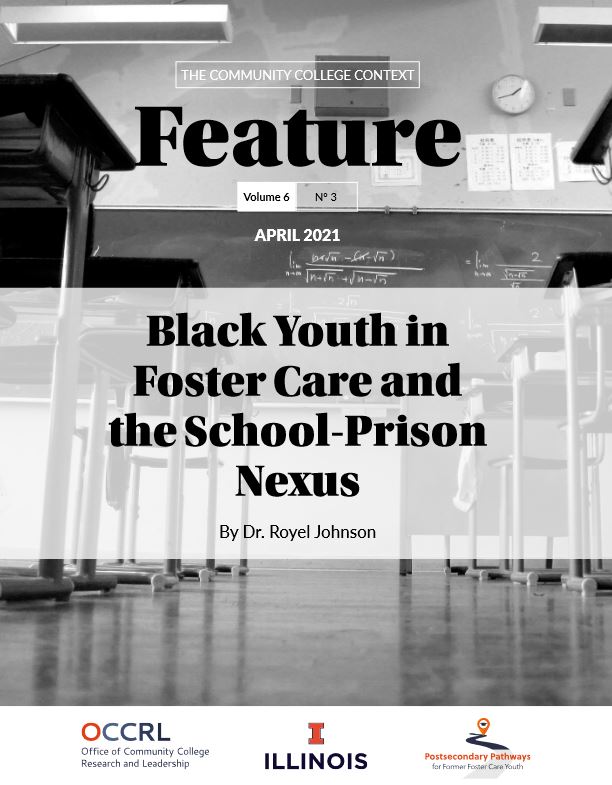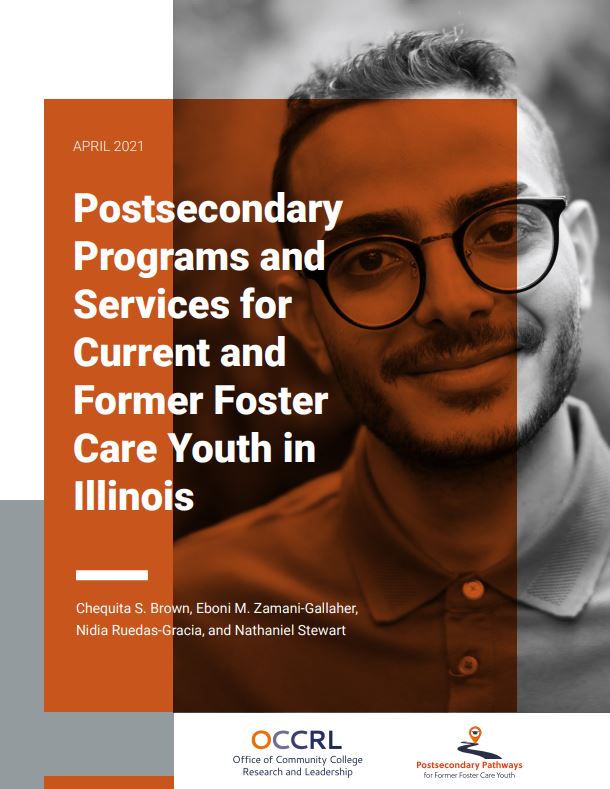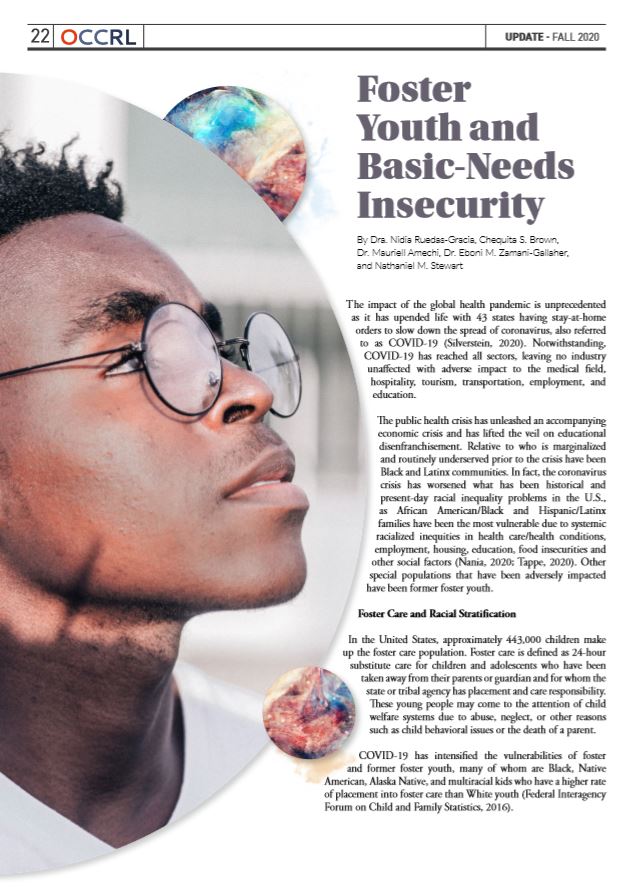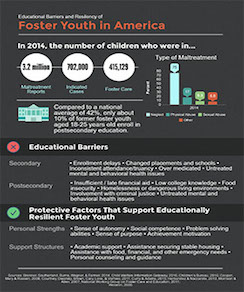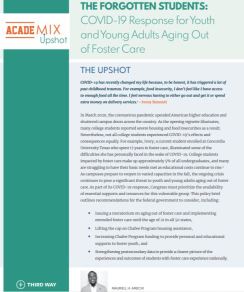Summary
The Postsecondary Pathways for Former Foster Care Youth (PP-FFCY) reflects OCCRL’s commitment to examining and developing postsecondary pathways that support mobility for first-generation, underserved, and minoritized populations, as well as strengthening career pathways to promote seamless transitions from college to careers. This project endeavors to examine postsecondary access, opportunities, and supports for foster youth in Illinois and other states across the county in addressing access and outcomes of FFCY in Career Technical Education (CTE).
Purpose
The Postsecondary Education Pathways for Former Foster Care Youth (PP-FFCY) project is an exploratory study focused on postsecondary pathways for current and former foster youth in Illinois. OCCRL is conducting a comprehensive-needs assessment that provides a descriptive profile of current and former foster youth populations in Illinois; examines postsecondary access, opportunities, and supports for foster youth in Illinois; and addresses disparities in career and technical education (CTE) programs. This project reflects OCCRL’s commitment to examining and developing postsecondary pathways that support mobility for first-generation, underserved, and minoritized populations as well as strengthening and supporting career pathways to promote seamless transitions from college to careers.
Resources
OCCRL aims to increase postsecondary awareness, access, and attainment for current and former foster care youth by providing information on programs and other resources that offer holistic support and services. View the list of postsecondary programs and services.
Podcasts
Strategies to Cultivate a Foster-Friendly Culture on Community College Campuses
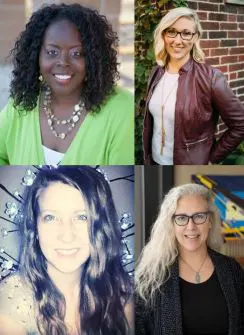 In this episode, Chequita Brown talks with Kate Danielson of the organization Foster Progress, as well as with Anna Wandtke and Tricia Wagner of Rock Valley College in Rockford, Illinois. The group discusses how to cultivate a foster-friendly culture at Illinois community colleges.
In this episode, Chequita Brown talks with Kate Danielson of the organization Foster Progress, as well as with Anna Wandtke and Tricia Wagner of Rock Valley College in Rockford, Illinois. The group discusses how to cultivate a foster-friendly culture at Illinois community colleges.
Navigating College as a Foster Care Alum
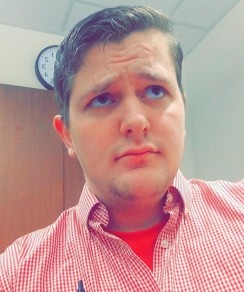 In this episode, OCCRL research assistant Chequita S. Brown talks with Jonathan Stacy, a sophomore at Heartland Community College who is pursuing his studies and a possible career in criminal justice.
In this episode, OCCRL research assistant Chequita S. Brown talks with Jonathan Stacy, a sophomore at Heartland Community College who is pursuing his studies and a possible career in criminal justice.
Listen to the podcast and view the transcript.
Key Elements to Successfully Connecting Foster Care Youth to Educational Resources for Postsecondary Success
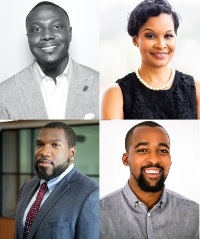 In this episode, Nathaniel Stewart talks with Mauriell Amechi, Regina Gavin Williams, and Blayne Stone Jr. about how the transitions and pathways to postsecondary education are similar and different for Black former foster care students. The scholars also discuss key elements to successfully connect foster care youth to educational resources that help advance the postsecondary education opportunities for this student population.
In this episode, Nathaniel Stewart talks with Mauriell Amechi, Regina Gavin Williams, and Blayne Stone Jr. about how the transitions and pathways to postsecondary education are similar and different for Black former foster care students. The scholars also discuss key elements to successfully connect foster care youth to educational resources that help advance the postsecondary education opportunities for this student population.
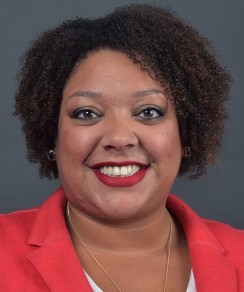
Maddy Day
The Impact of Campus-Based Support Programming on Foster Care Collegians' Postsecondary Access and Retention
In this episode, Chequita Brown of OCCRL talks with Maddy Day about the Fostering Success initiative in Michigan and the impact of campus-based support programming on foster carecollegians' postsecondary access and retention.
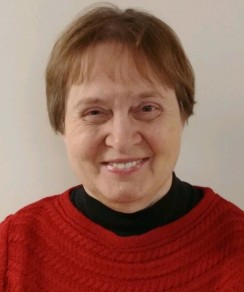
Patricia Palmer
How Youth-in-Care in Illinois Can Access Educational Resources to Pursue a Postsecondary Education
In this episode, OCCRL research assistant Chequita Brown continues the conversation on foster care youth by talking about with Patricia Palmer about accessing available resources in Illinois for youth-in-care who want to pursue a postsecondary education.
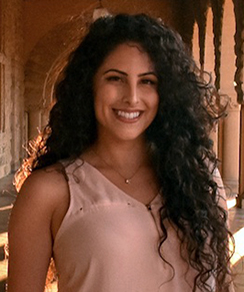
Nidia Ruedas-Gracia
Conceptualizing 'Sense of Belonging' Among Students From Historically Minoritized Racial Groups Within Higher Education
In this episode, Colvin Georges Jr., a research associate at OCCRL, talks with Dr. Nidia Ruedas-Gracia about what it means to have a sense of belonging and discusses her research in this area. They also discuss how a sense of belonging affects college students from historically minoritized racial groups.
Publications
Postsecondary Programs and Services for Current and Former Foster Care Youth in California
By Chequita S. Brown, Nidia Ruedas-Gracia, and Eboni M. Zamani-Gallaher
This brief highlights postsecondary programs and services in California that support youth in care, in addition to young adults who are aging out of foster care. Read more.
Tracking College-to-Career Pathways for Foster Youth
By Chequita S. Brown
In this OCCRL Thought Paper, Chequita S. Brown relates how tracking the data of students with foster care experience helps to recognize them as a legitimate student population. She offers recommendations on how to do this and conveys the many obstacles that can hinder the academic and career success of foster youth. Read more.
Black Youth in Foster and the School-Prison Nexus
By Royel Johnson
In this OCCRL Feature Brief, Dr. Royel Johnson argues that the foster care system, and more specifically congregate care facilities, are part and parcel to the enhancement of carceral state power. Read more.
Postsecondary Programs and Services for Current and Former Foster Care Youth in Illinois
By Chequita S. Brown, Eboni Zamani-Gallaher, Nidia Ruedas-Gracia, and Nathaniel M. Stewart
This research brief provides an overview of programs and services that helps strengthen postsecondary pathways for current and former foster youth in Illinois. Read more.
Foster Youth and Basic-Needs Insecurity
By Dra. Nidia Ruedas-Gracia, Chequita S. Brown, Dr. Mauriell Amechi, Dr. Eboni Zamani-Gallaher, and Nathaniel M. Stewart
This article discusses how COVID-19 has intensified the vulnerabilities of foster youth and former foster youth, many of whom are Black, Native American, Alaska Native, and multiracial children who have a higher rate of placement into foster care than White youth (Federal Interagency Forum on Child and Family Statistics, 2016). Read more.
(From the Fall 2020 UPDATE on Research and Leadership)
Exploring Equity in Postsecondary Education
By Heather L. Fox, Eboni M. Zamani-Gallaher
This chapter examines how postsecondary practitioners are encouraged to work collaboratively with child welfare agencies and other community-based organizations to identify and implement culturally responsive supports for former foster youth to promote early academic achievement. Read more.
The Forgotten Students: COVID-19 Response for Youth and Young Adults Aging Out of Foster Care
By Mauriell H. Amechi
This policy brief outlines recommendations for Congress to consider regarding the country's COVID-19 response, in an effort to prioritize the availability of essential supports and resources for youth and young adults who are aging out of foster care. Read more.
Voices and Viewpoints
Susan Faircloth Relates Her Purpose and Joy After Leaving the Academy
“How can we live in ways that are joyful and thriving as opposed to just surviving?” Dr. Susan Faircloth posed this question at the opening of her presentation to students, staff, and faculty on October 10, 2023, at the College of Education at Illinois.
Dr. Faircloth was invited to speak on campus as part of the Dean’s Distinguished Speaker Series. Her talk was titled “Schol(her)ship as an Act of Resistance and Survivance: Reflections from an Indigenous (M)other-Scholar.”
In January of 2023, Dr. Faircloth stepped down from her job as the director of the School of Education at Colorado State University. She then took a semester-long leave of absence to determine her future.
Dr. Faircloth said she was in an unhealthy place and had experienced two health scares. Moreover, she felt a sense of “otherness” and did not feel supported as an Indigenous female scholar and leader, reaching a point of ‘just surviving’ in the academy without enacting honest changes that supported her ideals.
During her time off, she reflected on her role in academia and listened to her heart and mind. Prior to the start of the fall 2023 semester, she decided to leave the job she loved to save herself and “recreate who Susan is.”
During her time off, she reflected on her role in academia and listened to her heart and mind.
For many years, Dr. Faircloth “allowed the academy to tell her a different story” of who she was and wasn’t. She is now trying to find her purpose and joy by reclaiming and narrating accurate accounts of her beliefs, values, strengths, and resilience as an Indigenous woman, mother, and scholar. As part of Two Feathers Consulting LLC, Dr. Faircloth can now engage and serve communities and organizations more directly.
Dr. Faircloth is a member of the Coharie tribe of North Carolina. She became an academic scholar 23 years ago when taking the director position in the American Indian Leadership Program at Pennsylvania State University. She was a former participant in this program and earned her master’s degree and doctorate in special education and educational leadership, respectively.
Dr. Faircloth was the only Indigenous woman scholar while she held the director position and the first Indigenous woman to be promoted to tenure during the institution’s existence. While in higher education, Dr. Faircloth engaged in oral-history projects with tribal members who attended an Indian school in East Carolina. She has done extensive Indigenous-centered research nationally and internationally to help improve the education outcomes of Indigenous youth and the sociocultural conditions of Indigenous communities.
Thirteen years ago, Dr. Faircloth and her husband adopted an American Indian baby girl from Oklahoma who was Cheyenne and Arapaho. A year later, the family of three moved to Fort Collins, Colorado, to reunite her daughter with the ancestral homelands of her people. This move was tied to a leadership position she accepted at Colorado State University—an institution that rests on land that has forcefully displaced the Cheyenne, Arapaho, and Ute Nations.
Dr. Faircloth said her presence at the university was a contested relationship and that she wouldn’t have been able to do the work she has done if not for the removal of Indigenous peoples. She challenged the audience to “move beyond performative acts of land acknowledgements” and begin doing social justice projects with “the peoples whose land we live, learn, and work.”
Dr. Faircloth is one of the few courageous Indigenous scholars who has embraced a leadership role in higher education for numerous years. “Leadership is hard; it’s also heart work, and it’s not for the faint of heart,” she said. According to the National Center for Education Statistics (2023), less than one half of 1% of full-time faculty in the U.S. identify as American Indian or Alaska Native. Of this percentage, even fewer Indigenous faculty hold administrative positions. They often encounter challenges and isolation (Riley et al., 2023).
Dr. Faircloth has experienced her share of challenges and loneliness as an Indigenous female scholar-leader. But she also has important life and career lessons to share:
- Weave Indigenous knowledge with Western knowledge. Couple Indigenous ways of knowing and research sovereignty with Western research practices.
- Balance community engagement and peer-reviewed publication. Only focusing on getting published is “educational malpractice,” she said. Scholars’ work should impact education and communities positively.
- Give back and mentor. Give back through scholarship, service, and presence and mentor other Indigenous scholars.
- Understand that scholarship is an ethical and political act. Scholarship involves relationships, responsibilities, respect, persistence, transparency, and reciprocity.
- Be justice-oriented. Be cognizant of how to challenge others; practice authenticity; be self-aware of your own beliefs, values, and dispositions; and prioritize being person- and family-centered rather than organization- and system-centered.
These lessons and her stories serve as guiding principles for academic scholars and leaders to reimagine the work they do in the academy. Dr. Faircloth said to share authentic narratives to challenge dominant structures and ideologies. She added that stories can be used as a tool to survive, feel purpose, and live joyfully.
Watch a video of the talk
References
National Center for Education Statistics. (2023). Characteristics of postsecondary faculty. Conditions of Education. U.S. Department of Education, Institute of Education Science. Retrieved October 23, 2023, from https://nces.ed.gov/programs/coe/indicator/csc
Riley, L., Hulama, K., Ka’o, H., & Paolo, G. (2023). Wrangling the system: How tenure impacts Indigenous research. Environment and Planning F, 2(1-2), 38-55. https://doi.org/10.1177/26349825221142290




